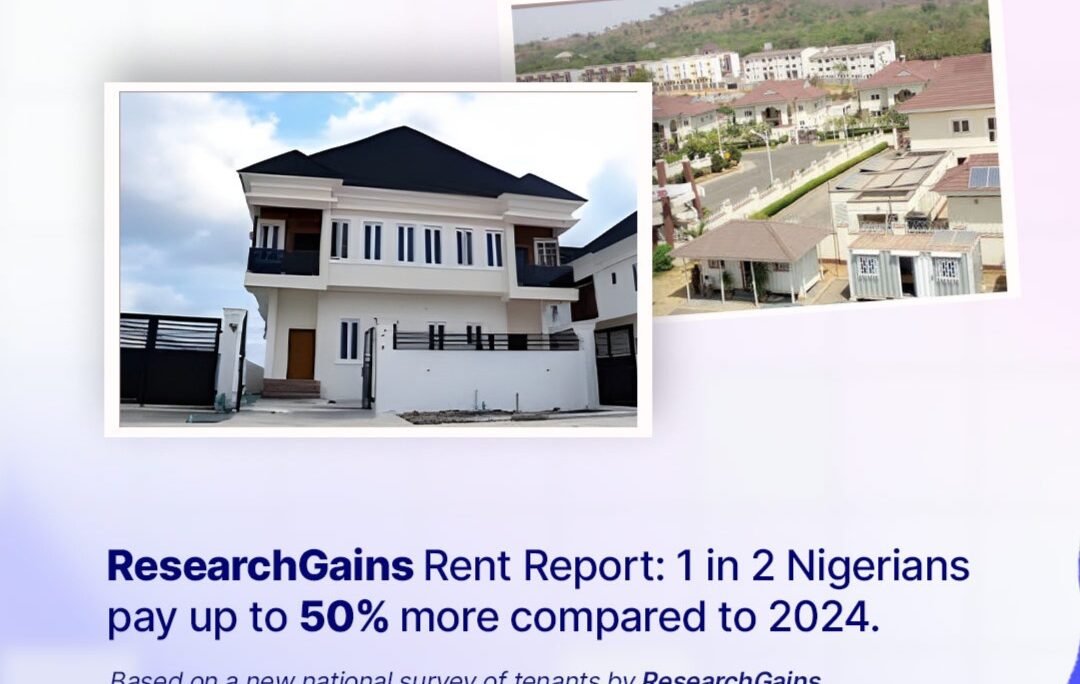Introduction
The Nigerian housing sector has witnessed significant volatility in recent years, with a surge in rental costs posing a major challenge for both employed and unemployed citizens. Driven by inflationary pressures, rising construction costs, and economic uncertainty, house rent affordability has become a critical socio-economic issue. This study provides an evidence-based analysis of recent survey findings on house rent increases, exploring their financial impact, the underlying causes, and coping strategies among Nigerian tenants.
The survey revealed that 96% of respondents experienced a rent increase, with only 2% reporting no change. Among those affected, 68% were unemployed, while 32% were employed, indicating that rent hikes cut across all economic classes but disproportionately burden those without steady income. Furthermore, 64% reported a significant increase in house rent, and 34% indicated a slight increase.
When asked about the magnitude of the increase, the data shows that 50% experienced a rise between 25% and 50%, while 42% saw increases below 25%. Alarmingly, 6% faced a jump of 75% to 100%, and 2% reported an increase exceeding 100%, signaling extreme cases of unaffordability.
Regarding prior notice from landlords, 62% of respondents received short notice, 32% got early notice, while 4% had no notice at all. This points to a trend where tenants are often caught unprepared, compounding financial stress.
The financial strain was evident as 56% of respondents described the impact as severe, 36% as moderate, and only 8% reported no impact. In response, tenants adopted various coping mechanisms: 36% cut expenses, 30% searched for cheaper accommodation, 20% moved in with family, 10% took loans, while 4% did nothing.
When asked if their current rent aligns with their housing needs, 40% said not at all, 40% said partly, and only 16% agreed it did, showing widespread dissatisfaction with housing affordability.
On perceived causes of rent increases, 40% attributed it to inflation, 24% to high demand, 16% to landlords’ discretion, and another 16% to housing agents, while 4% were unsure.
Finally, tenants suggested potential solutions: 58% called for better income opportunities, 28% advocated for rent control policies, 12% wanted public housing initiatives, and 2% requested rent loans.
The findings explain a deepening housing crisis in Nigeria, where soaring rent prices outpace income growth. The disproportionate impact on unemployed individuals signals a need for targeted social interventions. The prevalence of rent hikes between 25% and 50% suggests systemic inflationary pressures, while extreme cases (>100%) indicate exploitation in some rental markets.
The lack of adequate notice before rent adjustments reflects a regulatory gap, leaving tenants vulnerable. Furthermore, the severe financial impact reported by the majority highlights housing as a key driver of financial instability in Nigeria. Coping mechanisms such as expense cutting, relocation, and taking loans reveal the desperation of households to maintain shelter.
Policy responses must address both supply and demand factors. While inflation remains a macroeconomic challenge, introducing rent control regulations, expanding affordable housing schemes, and promoting housing finance innovations like rent-to-own models could mitigate the crisis. Additionally, improving income opportunities and enforcing notice periods for rent adjustments would provide tenants with better financial planning options.
Conclusion
The survey illustrates a troubling trend of rising rents in Nigeria, driven primarily by inflation and market forces. With most tenants experiencing severe financial strain and limited coping options, there is an urgent need for policy interventions that ensure housing affordability and stability. Without deliberate efforts to regulate rent increases and expand affordable housing, the Nigerian housing crisis will continue to worsen, exacerbating inequality and economic hardship.





